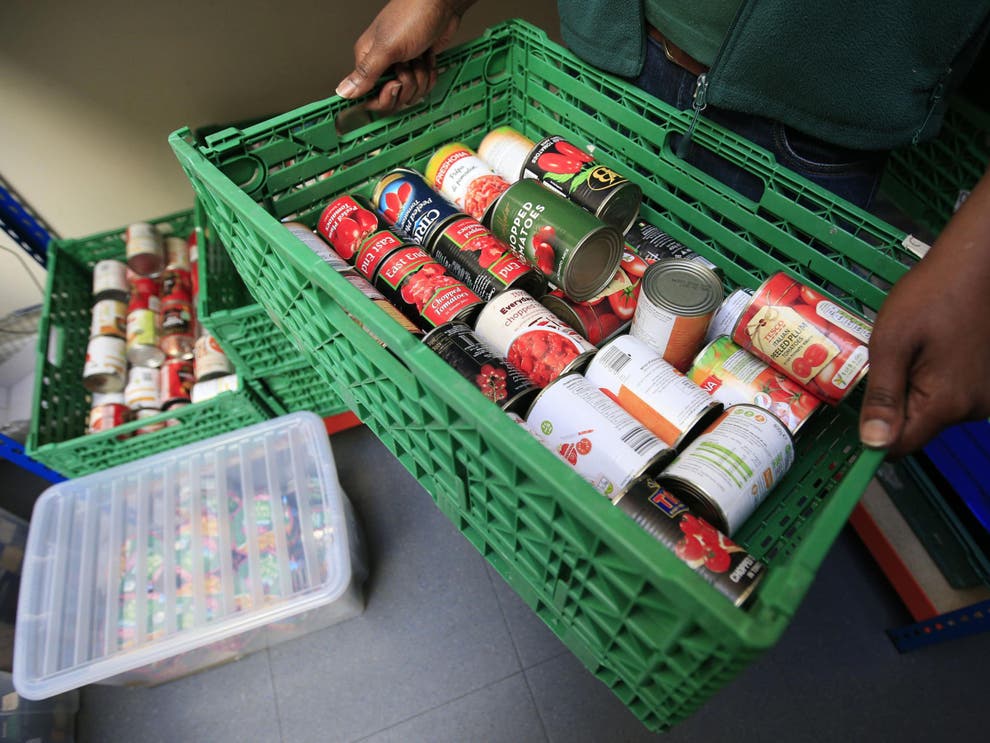Nearly half of food bank users in debt to DWP, research finds
Ministers urged to scrap five-week wait for universal credit after study reveals tens of thousands of households relying on food banks subject to benefit deductions

Nearly half of food bank users are in debt to the government, research shows, prompting renewed calls for ministers to scrap the five-week wait for universal credit, which forces people to take out advance loans.
The study, published by the Trussell Trust, reveals that between 22 June and 30 July 2020, 47 per cent of people using food banks were indebted to the Department for Work and Pensions (DWP), making it the most common creditor to this cohort.
Overall during this period, nine in 10 households at food banks were in debt, while six in 10 had arrears on bills and owed money on loans, according to the research, conducted by Heriot-Watt University.
When someone starts claiming universal credit, they wait up to five weeks to receive their first payment. If they cannot wait that long because they are already in financial hardship – as is the case for many claimants – they can request an advance from the DWP.
They can receive up to 100 per cent of their estimated universal credit payment in advance, but this must then be paid back in monthly installments. Claimants previously had 12 months to pay it back, but the DWP extended this to 24 months in April 2021.
Welfare groups say this system puts families in debt “right from the very start” leaving many “trapped them in destitution”, and called on ministers to urgently scrap the five-week wait for universal credit.
The Trussell Trust research also reveals that in the first quarter if 2020, the average monthly household income after housing costs for people who needed to use a food bank was £248, or £8 a day for a couple without children.
In response to these findings, shadow work and pensions secretary Jonathan Reynolds MP said: “How can anyone be expected to live on less than £250 a month? Universal credit simply isn’t giving people what they need to live on and is trapping families in a cycle of debt and destitution.
“Instead of supporting families through this crisis the government wants to cut universal credit, pushing more people into poverty. It’s just not good enough.”
The study also finds that in the first quarter of 2020, more than six in ten working-age people referred to a food bank during this period were disabled - more than three times the rate in the UK working age population.
Single-parent families were also more likely to be forced to a food bank with almost one in five households referred to food banks during the pandemic being single parents - more than twice the rate in the general population (8 per cent).
The findings show that people experiencing poor mental health referred to food banks in the Trussell Trust network grew from around half (51 per cent) in early 2020 to almost three quarters (72 per cent) in mid-2020.
Dame Louise Casey, former government adviser on social policy, said the findings were “deeply worrying” and an “abject failure by government”.
“Food aid should be a one-off in the UK not a new form of charity. It is in this government’s gift to end hunger, but it warrants a concerted cross government and cross-party action – a plan to end the need for food banks, delivered as an urgent priority,” she added.
Emma Revie, chief executive of the Trussell Trust, said: “Hunger in the UK isn’t about food – it’s about people not being able to afford the basics. We need government at all levels to commit to ending the need for food banks once and for all and to develop a plan to do so.”
Helen Barnard, director of the Joseph Rowntree Foundation, said the design of the social security system means people are kept in a situation where they “build up debts that trap them in destitution”.
Alison Garnham, chief executive of Child Poverty Action Group (CPAG), echoed her concerns, saying that forcing claimants to wait five weeks before they could receive a universal credit payment was “at the heart of this problem”, as it “put families in debt right from the very start”.
She added: “Benefit levels are already too low so when deductions are taken, struggle often turns into destitution. Instead of chasing the poorest families for money they don’t have, government should write off historic tax credit debts of more than two years and end the five-week wait.”
A government spokesperson said: “We are already supporting families who are most in need, spending billions more on welfare and planning a long-term route out of poverty by protecting jobs through furlough and helping people find new work through our Plan for Jobs.
“We also introduced our £269m Covid Local Support Grant to help children and families stay warm and well-fed throughout the pandemic.”
Join our commenting forum
Join thought-provoking conversations, follow other Independent readers and see their replies
Comments
Bookmark popover
Removed from bookmarks